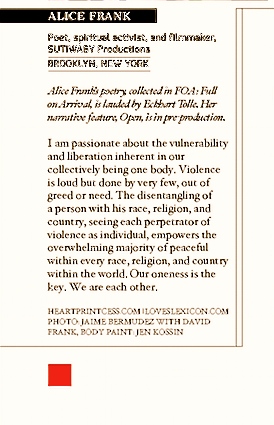O R N O B O D Y .
The disentangling of a person from his race, religion, and country - seeing each perpetrator of violence as individual, empowers the overwhelming majority of the peaceful, within every race, religion, and country.
See the oppressed in the oppressor. The oppressed become the oppressors, until we witness the cycle with compassion and understanding.
If we divide into two camps - even into violent and the nonviolent - and stand in one camp while attacking the other, the world will never have peace. - Ayya Khema
Even the most peacefully intentioned among us, if we find ourselves anti-Israel or anti-Palestine, we are unconsciously contributing to war.
I S R A E L : ' We are commanded to love our neighbor as ourself. How can I do this if my neighbor has wronged me? '
The rabbi answered, ' You must understand these words correctly. Love your neighbor like something which you yourself are. For all souls are one. '
I N E X T R I C A B L Y B O U N D
The division of an atom is mass destruction, only because it was once O N E . So with the oneness inherent in the descendants of Abraham. Here, it is possible to put the atom back together.
The root of all people is made of two desires: The desire to give of themselves, and to be known, seen, and heard. When there is an obstacle in the natural flow of this happening, war is c r e a t e d .
The survival of everybody ( person and p e o p l e ) on this planet is contingent upon everybody on this planet feeling known, seen, heard. • ( L i s t e n , S e e , K n o w . )
Wherever on the body it is hit, the One is wounded.
W E A R E E A C H O T H E R .
Wherever on the body it is hit, the One is wounded.
' It may happen that your hand makes a mistake and hits you. But would you then take a stick and punish your hand because it lacked understanding, and so increase your pain? It is the same if your neighbor, who is of one soul with you, wrongs you because he does not understand. If you punish him, you only hurt yourself. ' - Rabbi Shmelke, Nikolsburg
If we fail to immediately realize and live by the fact that we are inextricably bound, not only will our humanity be lost, irrevocably for a long time, but humans in their forms of flesh will be wiped out from all sides. There are no sides but the inside where each person is divine and wants only to be safe- seen, known, heard.
There are governmental and extremist factions. There is a cancer of hate that stems out of either greed or need. The most effective way to restore the body to health is making each white blood cell- each person - comprising the majority of each nation, race, and religion, other than the outliers of government and extremism. The people are the nuclei, and must be made to feel safe- seen, known, heard.
When we become deluded by propaganda of separation, we erroneously and catastrophically believe that if you shoot the territory on the other side of the body, it makes you safer.
The truth is as you shoot anywhere, you kill the entire body.
In this dimensional reality, that means as you kill children of those you perceive as other, this will have implications upon the children of those you call your children.
THIS IS THE UNIVERSAL PAIN-BODY.
The implications of there being a Universal, Collective Pain-Body are many. It means that human suffering and emotional wounds transcend geographical and cultural boundaries. The pain experienced by individuals or groups in different parts of the world are in fact all of ours, and we would do well to diminish the suffering for all.
When one group or individual experiences deep pain, trauma, or conflict, it creates a ripple effect that impacts the collective consciousness of humanity. This shared pain contributes to a cycle of violence and conflict as the suffering of one group can trigger responses from others who empathize with or feel threatened by that pain.
Ultimately, the idea of a universal collective "pain-body" underscores the interconnectedness of humanity. It is time to wake up to the undercurrent of human existence. This awakening is what every conflict at its core is asking for.
Film edit by Louis Ekrem @ Laughing Cat Productions
' Our futures are inextricably bound ' - Martin Luther King Jr.
VIOLENCE IS LOUD BUT , OUT OF GREED OR NEED , IS DONE BY V E R Y F E W .
THE O V E R W H E L M I N G M A J O R I T Y WANTS PEACE .
I S L A M : ' That which you want for yourself, seek for mankind. ' - Conversations with Muhammad
The cataclysm of the middle east is an evolutionary c a t a l y s t , eking out bias in the dark of every peace-maker, bringing us more deeply into
O N E N E S S E M B O D I E D
•
P H O T O G R A P H S : J A I M E B E R M U D E Z • P A I N T : J E N K O S S I N















